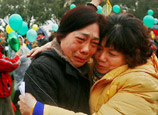
GUANGZHOU, March 26 (Xinhua) -- The government of south China's Guangdong Province on Monday announced rules to cool the property market after the central government rolled out a regulatory plan and asked provincial governments to create specific measures.
The rules, however, have been criticized for being too vague and unable to function properly.
Guangdong's provincial government said in a notice that housing prices will be curbed, government-subsidized housing will be built more quickly and housing data will be pooled in order to boost market supervision.
In first-tier cities like Guangzhou and Shenzhen, people who already own houses or have not had residency in the city for a specified time will be banned from buying property. Ceiling prices will be capped to prevent them from rising too quickly, according to the notice.
Property purchases in smaller cities like Foshan and Zhuhai will also be limited to curb speculation.
Guangdong's rules came after the central government rolled out a plan on March 1 to tighten control over the property market amid expectations for rising housing prices.
Among the measures, the central government announced a dramatic increase for the income tax levied on transactions involving second-hand houses, a move that has triggered widespread panic among both buyers and sellers.
The government said homeowners who sell their houses will pay an income tax as high as 20 percent of the profits they make on the transaction, significantly more than the previous income tax of 1 to 2 percent of the final sale price.
The central government asked local governments to work out specific schedules before the end of March and said it will step up inspections of provincial-level governments' property market control efforts. Those who fail to meet their targets will be penalized, the government said.
The property market, particularly the second-hand housing market, has since witnessed a significant number of transactions amid worries that the new tax rules will push housing prices even higher.
In Guangzhou, the number of second-hand housing transactions in the first 22 days of March totaled 6,043, far outnumbering the February figure of 1,541.
Experts say the Guangdong government's announcement was too vague, as the government failed to specify when and how the 20-percent tax, which will have the most direct impact on the market, will be levied.
The provincial government said it will strictly abide by the central government's income tax regulations.
A Guangzhou resident surnamed Zhang said he is concerned about the new housing policies, but was disappointed by the announcement.
"The measures outlined by the Guangdong government failed to specify the two core issues: income tax and housing price control targets," Zhang said.
Similar housing price regulations are expected to be announced in other provinces next week.
Market observers say sufficient land supplies and tight control over prices are necessary to cool the market. Both will decrease revenues for local governments, which depend on land sales to stay afloat.
"Whether the central government measures will take effect remains uncertain and will depend on on strict supervision by regulatory authorities," said Chen Sheng, executive director of the China Real Estate Data Academy.
















 6 Danes probed for drunkenly urinating on an elevated road in full view
6 Danes probed for drunkenly urinating on an elevated road in full view


![]()
